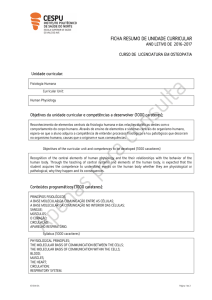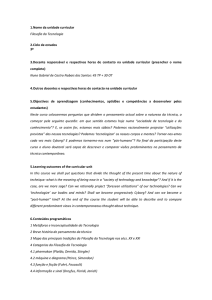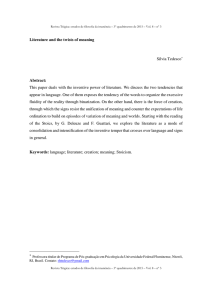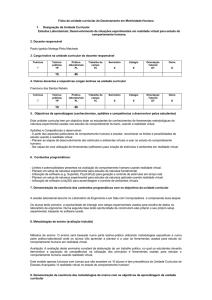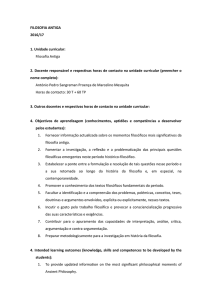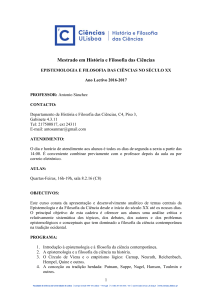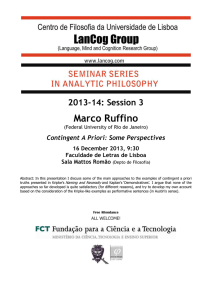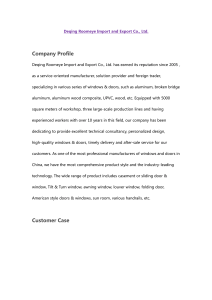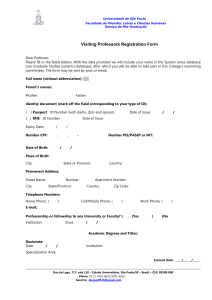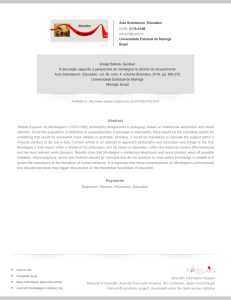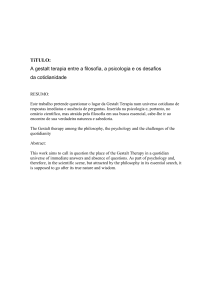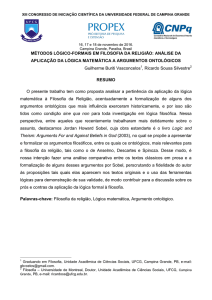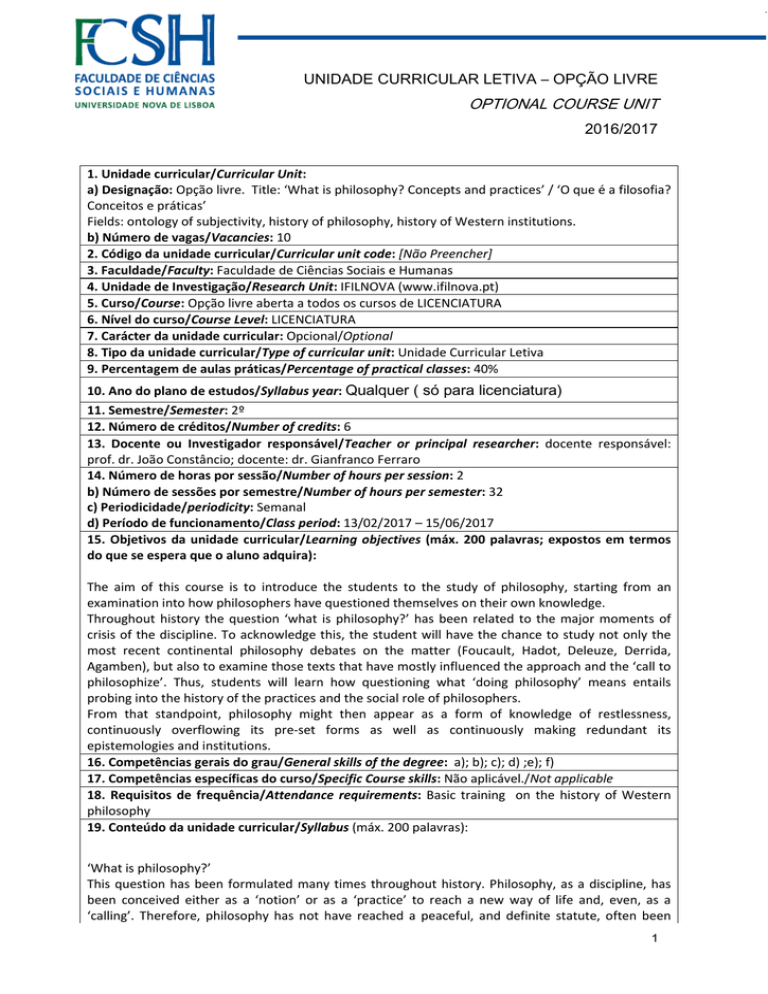
UNIDADE CURRICULAR LETIVA – OPÇÃO LIVRE
OPTIONAL COURSE UNIT
2016/2017
1. Unidade curricular/Curricular Unit:
a) Designação: Opção livre. Title: ‘What is philosophy? Concepts and practices’ / ‘O que é a filosofia?
Conceitos e práticas’
Fields: ontology of subjectivity, history of philosophy, history of Western institutions.
b) Número de vagas/Vacancies: 10
2. Código da unidade curricular/Curricular unit code: [Não Preencher]
3. Faculdade/Faculty: Faculdade de Ciências Sociais e Humanas
4. Unidade de Investigação/Research Unit: IFILNOVA (www.ifilnova.pt)
5. Curso/Course: Opção livre aberta a todos os cursos de LICENCIATURA
6. Nível do curso/Course Level: LICENCIATURA
7. Carácter da unidade curricular: Opcional/Optional
8. Tipo da unidade curricular/Type of curricular unit: Unidade Curricular Letiva
9. Percentagem de aulas práticas/Percentage of practical classes: 40%
10. Ano do plano de estudos/Syllabus year: Qualquer ( só para licenciatura)
11. Semestre/Semester: 2º
12. Número de créditos/Number of credits: 6
13. Docente ou Investigador responsável/Teacher or principal researcher: docente responsável:
prof. dr. João Constâncio; docente: dr. Gianfranco Ferraro
14. Número de horas por sessão/Number of hours per session: 2
b) Número de sessões por semestre/Number of hours per semester: 32
c) Periodicidade/periodicity: Semanal
d) Período de funcionamento/Class period: 13/02/2017 – 15/06/2017
15. Objetivos da unidade curricular/Learning objectives (máx. 200 palavras; expostos em termos
do que se espera que o aluno adquira):
The aim of this course is to introduce the students to the study of philosophy, starting from an
examination into how philosophers have questioned themselves on their own knowledge.
Throughout history the question ‘what is philosophy?’ has been related to the major moments of
crisis of the discipline. To acknowledge this, the student will have the chance to study not only the
most recent continental philosophy debates on the matter (Foucault, Hadot, Deleuze, Derrida,
Agamben), but also to examine those texts that have mostly influenced the approach and the ‘call to
philosophize’. Thus, students will learn how questioning what ‘doing philosophy’ means entails
probing into the history of the practices and the social role of philosophers.
From that standpoint, philosophy might then appear as a form of knowledge of restlessness,
continuously overflowing its pre-set forms as well as continuously making redundant its
epistemologies and institutions.
16. Competências gerais do grau/General skills of the degree: a); b); c); d) ;e); f)
17. Competências específicas do curso/Specific Course skills: Não aplicável./Not applicable
18. Requisitos de frequência/Attendance requirements: Basic training on the history of Western
philosophy
19. Conteúdo da unidade curricular/Syllabus (máx. 200 palavras):
‘What is philosophy?’
This question has been formulated many times throughout history. Philosophy, as a discipline, has
been conceived either as a ‘notion’ or as a ‘practice’ to reach a new way of life and, even, as a
‘calling’. Therefore, philosophy has not have reached a peaceful, and definite statute, often been
1
UNIDADE CURRICULAR LETIVA – OPÇÃO LIVRE
OPTIONAL COURSE UNIT
2016/2017
questioned in moments of crisis in Western forms of subjectivity. Nevertheless, ‘philosophy’ might
be considered as an umbrella term gathering different disciplines and theoretical practices having
‘truth’ as its very object of study: that is, not only truth about the world and the subject amazed by
the world, but also the truth as an specific outcome of particular ‘techniques of the Self’.
Furthermore throughout the history of philosophy, we can observe an amazing impulse to ‘create’
institutions, political forms, and subjectivities: since its very beginning, philosophy has also been a
practice of transformation, of the re-creation of these forms.
Nowadays, the discipline is again under ‘evaluation’ and its institutional forms seem to be under a
great crisis. For instance, Jacques Derrida once asked to philosophers to build a university ‘without
conditions’. More recently Pierre Hadot tried to discover again the practice of philosophy as spiritual
exercise. In his last lessons, Foucault investigated the relation between philosophy and ‘care of the
self’. This unit addresses young students approaching philosophy for their first time, as well as more
advanced students desiring to examine in depth the cultural persistence of the amazing passion for
philosophy.
20. Bibliografia recomendada/Recommended reading: (máx. 5 títulos. Por ordem decrescente de
data de edição.)
1. G. COLLI, O nascimento da filosofia, Edições 70, 1996;
OU P. HADOT, Exercicios espirituais e filosofia antiga, É realizações, 2014;
OU M. FOUCAULT, A coragem da verdade, WMF Martins Fontes, 2011
2. PLATÃO, Apologia de Sócrates, Fedão, Alcibiades I (qualquer edição);
OU ARISTOTELES, Protréptico (qualquer edição);
3. BOÉCIO, Consolação da Filosofia, Fundação Calouste Gulbenkian, 2011;
SENECA, Cartas a Lucilio, Fundação Calouste Gulbenkian, Lisboa, 2008;
AGOSTINHO, Confissões, Imprensa nacional – Casa da Moeda, 2001;
4. SCHOPENHAUER, Sobre a filosofia e seu método, WMF Martins Fontes, 2010;
U F. NIETZSCHE, Schopenhauer como educador, UNICAMP, 1999;
5. G. DELEUZE, O que é a filosofia?, Editora 34, 1992;
OU M. FOUCAULT, A Hermenêutica do sujeito, WMF Martins Fontes, 2006;
OU J. DERRIDA, A universidade sem condição, Estação libertade, 2003;
U G. AGAMBEN, Che cos'è la filosofia? Quodlibet 2016.
21. Métodos de ensino/Teaching Methods: Lectures; Cooperative learning activities; Seminars.
22. Métodos de avaliação/Assessment methods: Paper (40%); In-class presentation (60%) OR Final
exam (short questions).
23. Língua de ensino/Teaching language: English/Português
2

